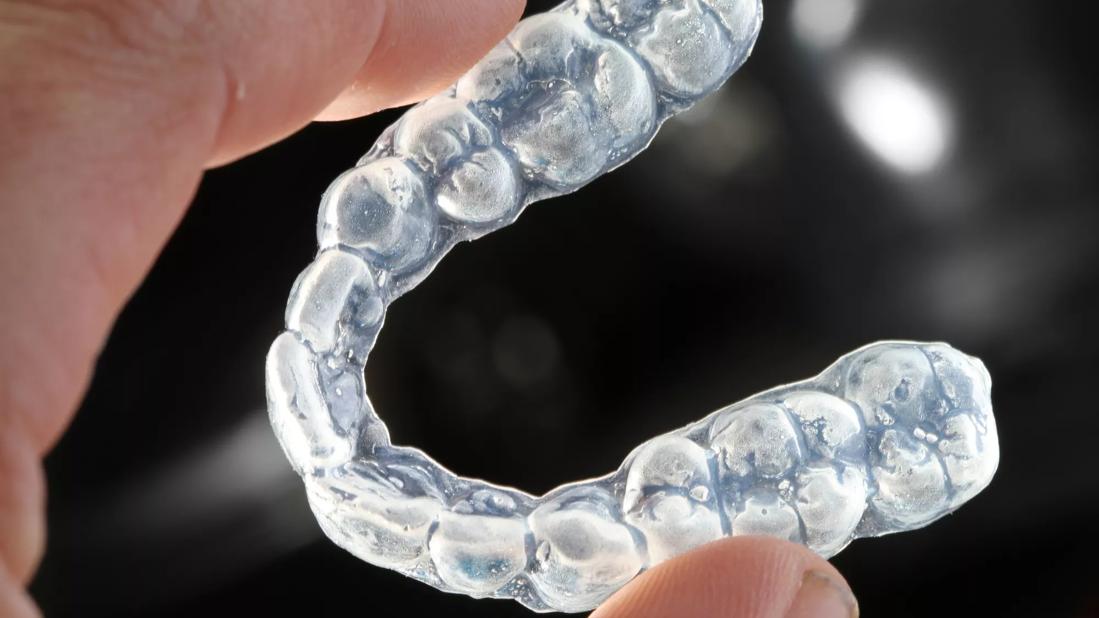What might be causing it and what you can do

Image content: This image is available to view online.
View image online (https://assets.clevelandclinic.org/transform/addc99c6-5f17-4ebb-b817-cf83e4839ab7/MouthGuardTeethGrinding_jpg)
Waking Up With a Sore Jaw? You May Be Grinding Your Teeth
If your teeth hurt or your jaw is sore when you wake up, you’re likely grinding your teeth or clenching your jaw at night. Because you can develop long-term problems, it’s important to find out what’s going on.
Advertisement
Cleveland Clinic is a non-profit academic medical center. Advertising on our site helps support our mission. We do not endorse non-Cleveland Clinic products or services. Policy
The behavior, known as bruxism, is not uncommon in children but is recognized more often in adults.
“We don’t have a good way to stop a patient from grinding at night,” says dentist Karyn Kahn, DDS. “All we can do is address the effects of the grinding and clenching and help reduce symptoms.”
Research has shown that bruxism originates in the central nervous system. Research also shows that taking antidepressants, especially SSRIs (selective serotonin reuptake inhibitors), can lead to teeth grinding, as can anxiety and stress. Having a competitive personality, alcohol use, smoking and a family history may also play a role for some people.
Talk to your dentist if you experience any of these symptoms of teeth grinding or jaw clenching:
In the short term, grinding and clenching can damage your TMJ, the hinge joints connecting your lower jaw to your skull. Too much pressure resulting from muscle contraction in grinding/clenching can lead to popping, clicking, jaw locking, earaches, headaches and facial pain.
Advertisement
If the behavior continues, it can cause facial pain that is chronic (lasting more than six months), tooth fractures, daily headaches, migraines and chronic TMJ problems.
Although there’s no way to stop grinding your teeth or clenching your jaw at night, “your dentist can fit you with a ‘nightguard’ by making custom impressions of your teeth,” says Dr. Kahn. “Dental fabricated nightguards are designed to provide a stable bite that does not interfere with a healthy, comfortable jaw closure.”
Adjustment of the device by a dentist can help reduce contraction of jaw muscles during bruxism, which may minimize jaw joint stress and protect tooth enamel.
Over-the-counter mouthguards provide coverage only over the teeth, she notes.
Daytime teeth grinding and jaw clenching are often unconscious behaviors, but you can train yourself not to do them, Dr. Kahn says.
The key is to maintain a proper mouth position. Whenever you think of it, keep your lips together with your teeth slightly apart, and rest your tongue against the back of your front teeth. Doing this eliminates jaw joint stress and stops you from grinding your teeth during the day.
“It’s a controllable habit, but many people are unaware of it,” Dr. Kahn says. “You can leave little sticky notes around for yourself that can remind you to unclench your jaw.”
Advertisement

Delivered every Tuesday!
Sign up for our Health Essentials emails for expert guidance on nutrition, fitness, sleep, skin care and more
It's a letter about the news!

Every two weeks once
Sign up for our Health Essentials emails for expert guidance on nutrition, fitness, sleep, skin care and more.
Learn more about our editorial process.
Advertisement
From posture to massage, these 9 at-home remedies may help ease your jaw pain
If you have discomfort and pain in your face, it could mean something serious is going on
Most recommended precautions center around minimizing bruising or swelling
Even one drink can have an impact on your cognitive function leading to slurred speech, blurred vision and impaired memory
Understand who may (and may not) benefit
Lorem ipsum dolor sit amet. Et odio Quis vel ipsam omnis eum alias deleniti et placeat impedit non voluptas galisum hic autem enim et cupiditate aliquid. Est beatae quidem non facilis autem ut commodi nisi aut tempore rerum et dolores voluptatem cum enim optio id sapiente quasi. Ad laboriosam officiis 33 cupiditate sequi ea voluptatum consectetur qui necessitatibus voluptate et quasi doloremque et facere explicabo quo explicabo officia
Type 2 diabetes isn’t inevitable with these dietary changes
Applying a hot or cold compress can help with pain
Pump up your iron intake with foods like tuna, tofu and turkey